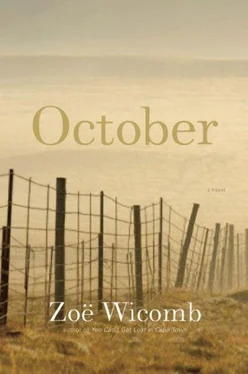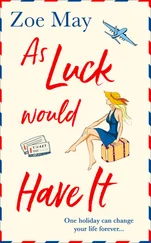No, Mercia screamed, please, don’t punish Jake. I’ll take the hiding. Which she got anyway for trying to interfere, but that could not prevent the seven lashes that God had ordained for Jake. Their mother stood with her back against the wall, arms folded, tall and expressionless. She could not possibly have approved, so why had she said nothing? Jake was after all her favorite, as anyone could see.
The next day Mercia found Jake holding the bunch of dripping kalkoentjies by their stems, ready to crush them underfoot. She snatched at the flowers, but Jake smashed the jar all the same. Later he claimed it was an accident, that he had run into the room, and taking off his hat had swiped the jar that must have been on the edge of the cupboard. Then he fetched the aapstert from its hook behind the door, but their father thundered that he was to put it back, that only God decided on chastisement. Their father heaved with rage, which surely showed a rift between him and God.
Nicky is lying on his belly, sniffing at the chincherinchees, a spot of pollen yellow on his brown nose. He says it has a quiet smell, nice and fresh. How did the bulbs get there in the first place, how did they know to hide here? Mercy shrugs her shoulders. Then it must be God, the child says, when things can’t be known it’s because of God.
Or perhaps the troll, she laughs. Once you learn to read, you’ll see that things you don’t know can be looked up in a book.
Ah, he says triumphantly, but Mamma says God also made all the books. Will God mind if they pick the flowers?
Her heart breaks for the repetition, the foreboding, and breaks again as he says, I could take it back for Mamma. Something screams in her head as she says quietly, There are two ways of thinking about it. On the one hand: how beautiful these white flowers would look at home in a vase, how your mamma would love such a present; on the other hand, they’ll die so much sooner before they were meant to and, besides, any other children who come to explore here won’t be able to see them.
So what shall we do? the child asks.
That is for you to decide, she says to the beat of a sledgehammer in her head and the roar of blood in her chest. It is not in her power to ward off disaster.
I could pick just one to show Mamma, and when it’s in a glass at home I’ll try to remember the whole big clump of flowers, and Nicky bowls his arms for holding a huge imaginary bunch.
But as he squats by the clump of chincherinchees, wrinkling his nose in search of the delicate fragrance, looking intently, he says that he wouldn’t forget. There is a long spike with a head carrying lots of little starry flowers, each with a central sac of yellow pollen, all bunched together, a basket of petals. A green spike so, so long, and he holds his hands an exaggerated twelve inches apart. Yes, he could easily remember that and he could tell his mamma, explain the chincherinchees to her; she is good at seeing things he talks about, although the smell would be hard; he doesn’t suppose she’d get the smell at all. He, Nicky, would remember it, even once he got home, but carrying it over to her exactly, that he couldn’t be sure of, that he would just have to try. He digs into his pocket for a handful of goat droppings. These drolletjies, he explains, would help the plants to keep healthy. He is not so very keen that other children should find this cave, but if they do at least the chincherinchees — he says each syllable carefully — would be looking their best, and the children wouldn’t dare to pick them.
Does Auntie Mercy know that drolletjies make things grow better? he asks, sprinkling a handful at the base of the clump of flowers. He would keep a few in his pocket to help him remember.
In her own pocket Mercia finds a paper tissue, not entirely clean, which she uses to wipe a smudge from his face and to dust down his shirt and trousers. It is not possible to remove the stain of earth on which he has lain. Then she remembers, unsolicited, the official name: Gladiolus alatus iridaceae; she had looked it up many years later. Why is it this name rather than the homely Afrikaans, kalkoentjie, that makes the eyes prick? Does Mercia know that what threatens are tears of self-pity, that she is touched by her own difference, her distance from home? It is the thought of the child by her side that stanches the tears. This is no time for sentiment, no place for crying, she admonishes herself, and so she launches into a description of giant gladioli you could buy at florists’ in town. Is that, she wonders, why Sylvie prattles? Does the heart command speech in order to clear a path for the child? This place, home, is a place for doing and thinking at an angle, a place where speech, triumphing over genteel silence, has many different functions.
Back home, Sylvie dusts roughly at the boy’s trousers. Ag, liewe Here, look how he’s got himself in a mess, she complains, but at least he’s safe, and she ruffles his hair, as if indeed the child has been taken on a dangerous outing.
Mam-ma, he squeals, squirming out of her grip, I saw the magic flowers in the troll’s cave. Like white stars in the dark.
Oh yes, Sylvie says, you found tjienkerientjees. Why didn’t you pick some for Mamma? They last very, very long in water.

In spite of Mercia’s explanation about seasons and her reassurances to the child the previous day, it rains. And that in October, the lovely, loveliest month.
Sylvie laughs; she is a sugar lump; she dissolves in the rain. If it weren’t for the important job of making boerewors today, she’d wait until the rain stops. Mercia must now know that that is her job. Hers is the best boerewors in Namaqualand, a recipe she worked on for months until it was just right, an improvement on old Lodewyk’s slapdash mixture. In that case, Mercia says, she’ll drive Sylvie to Lodewyk’s butchery, prevent her from dissolving, and the girl crows with laughter, but then she bundles the child on her lap in the front seat, which Mercia will not have, so that the mood changes. Sylvie shakes her head, Ai Yissus! she complains, such fussing, as she straps Nicky into the backseat.
At the stoplight Mercia points out to the child the wayward behavior of water on the windscreen. There are steady rivulets trickling down the glass, then for no apparent reason they stop in their tracks, momentarily, before a radical change of direction. The boy is mesmerized. He strains forward in his seat. Look, look how it turns on its heels, he shouts, as a rivulet skids horizontally across, refusing to roll down in an orderly, or rather, expected manner. The chaotic flow of water on the windscreen keeps them entertained, so that she does not have to speak to Sylvie.
Nicky says that Auntie Mercy has brought this good, cool weather. He loves rain, and one day he’ll have a car so that he can watch at close range the water tumbling about on the glass, changing its mind. But his mother says that changing your mind is not something to be admired. You’ve got to stick with things. There’s no other way. Make your bed and lie in it.
So why, Mercia wonders, is Sylvie prepared to give the child away? But that, she revises, may not be a fair question. The poor have always had to gird their loins and harden their hearts, packing off their children to be raised by grandparents. Or handing them over to more prosperous family members in the hope of better lives for their offspring. It was not so long ago that the barbaric Homelands policy for those less privileged than coloreds was justified by the belief that black people do not care for their children in the usual ways. Just look at how they pass them round! Wages from the cities easily compensate for leaving behind children in the desolate Bantustans! Distancing herself from the cant, Mercia still cannot help thinking that Sylvie ought not to part from her child.
Читать дальше













